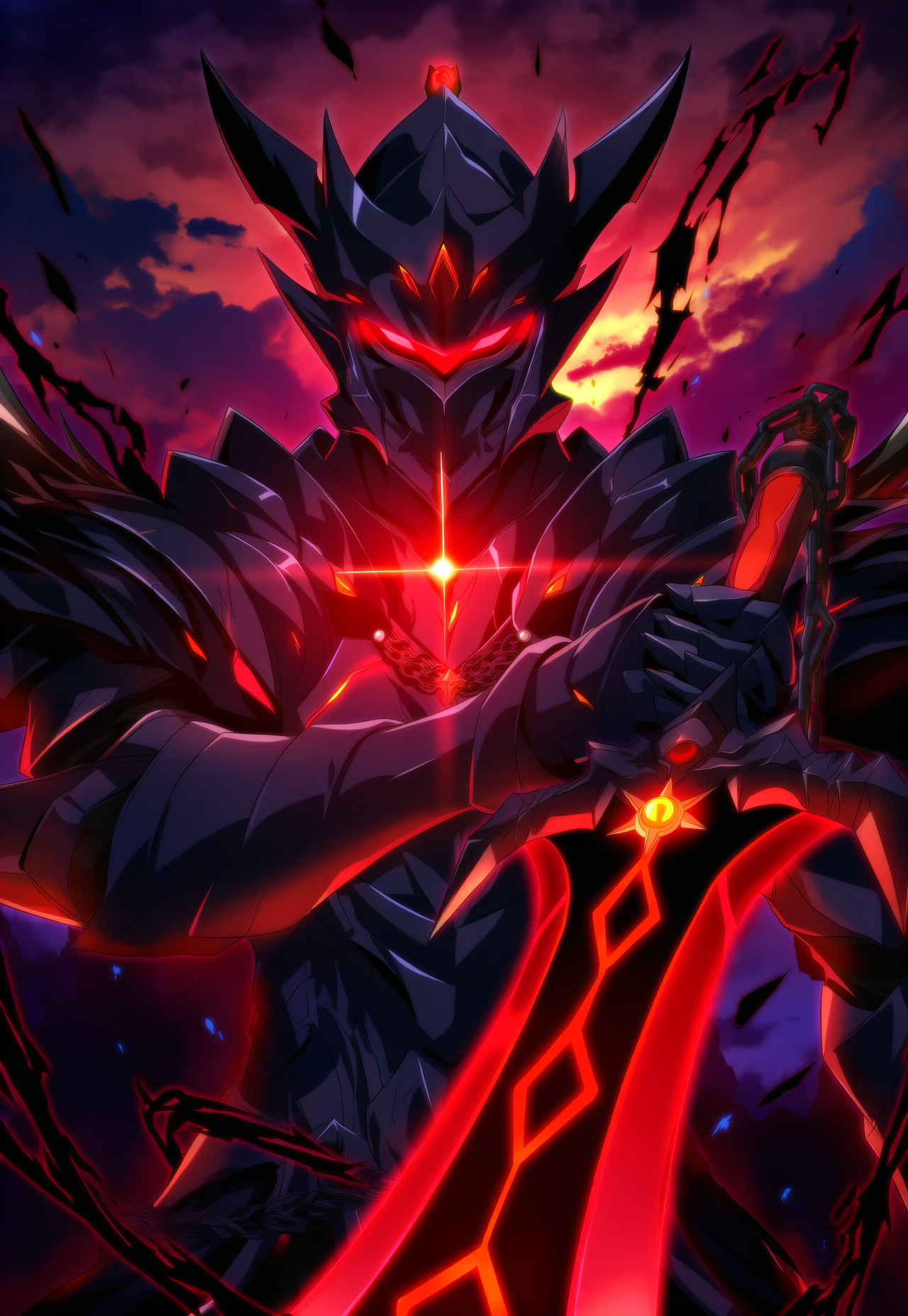Hayasa
- 1. Appearance
- 2. Personality
- 3. History
- 4. Synopsis
- 5. Trivia
Appearance
Hayasa's true form is a towering knight clad in pitch-black armor, its surface etched with glowing crimson veins that pulse like molten chains. His helm is jagged and sharp, hiding any trace of humanity behind a visor that burns with red light, as if judgment itself stares out from within. A massive blade, forged from shadow and searing fire, rests in his grip - more a symbol of punishment than a weapon. Chains coil across his chest and arms, rattling faintly with every step, binding him as much as they bind his prey. In his presence, the air feels heavy, as though the iron weight of a prison cell has closed around all who look upon him.
Personality
Hayasa is rigid, disciplined, and utterly unyielding. Shaped by a lifetime of serving as a jailor, he sees judgment not as cruelty, but as sacred duty. He despises corruption and rebellion, yet he believes mercy is weakness and that all beings must pay for their transgressions - even kings, even gods. Hayasa speaks rarely, but when he does, his words fall like a verdict, final and cold. To him, punishment is order, chains are law, and prisons are eternal. He neither creates nor destroys for pleasure - he exists to enforce Kirata's will through judgment unending.
History
Mortal Life
Hayasa was born into a lineage of jailors. For generations, his family had served kings and lords by guarding prisons, breaking wills, and extracting confessions through pain. To them, it was not cruelty but duty - a service to crown and law. From childhood, Hayasa was raised among iron bars, chains, and the cries of the condemned. He came to see punishment as not only necessary, but sacred.
Though others might have despised such work, Hayasa carried it with pride. To him, the prison was order itself, and those who entered its walls were stripped of their chaos and forced to obey.
The Descent into Darkness
In his youth, Hayasa served a proud king, loyal to his oath as his fathers had before him. But years of listening to screams - not only of traitors and thieves, but of innocents crushed by corruption - twisted his faith. One day, the line between prisoner and ruler blurred. The king himself, in Hayasa's eyes, was guilty of greater crimes than those rotting in the cells.
And so, in a moment of grim resolve, Hayasa turned his instruments upon the king. What had once been punishment at the king's command became punishment of the king himself. To Hayasa, this was not rebellion - it was justice. But to the world, it was treason.
From that day forward, he ceased to be a jailor of men and became a jailor of all authority. He punished nobles, knights, and lords alike, dragging them into the darkness of his cells. He believed none were above judgment.
Rebirth as a God
When death finally came for him, Hayasa's hands were stained with the blood of rulers, his heart filled with an unshakable conviction: all must be punished in the end. Kirata saw in him not madness, but devotion to order taken to its extreme.
He awoke in the void, his body reshaped into a monstrous form of iron and chains. His passion for punishment remained, but now every thought forged prisons that could confine not only flesh, but the soul itself. He wandered through endless darkness, the silence broken only by the rattle of his chains, until at last he reached the great Light - Kirata's throne.
There, he found ten others, seated in a circle of twelve. His place was the second seat to the left of the throne.
Role and Current State
As the Second Moon, Hayasa embodies judgment, punishment, and the eternal prison. He is neither creator nor destroyer, but the warden who ensures Kirata's will is enforced without mercy. Within the Abyss, his dominion manifests as an endless fortress of cells and chains, where traitors, rebels, and even gods who defy their Lord are cast into confinement.
Hayasa can only be glimpsed in the Abyss during February, where his shadow stretches across mortal prisons and places of punishment. To those who feel guilt or await judgment, his presence is a weight upon the soul, a reminder that no crime escapes the eternal jailor.
Synopsis
The Second Moon of the Abyss Gods, the eternal jailor who forged punishment into law. His prisons bind not only flesh, but will and spirit, ensuring that none can escape the judgment of Kirata.
Trivia
Hayasa was born into a family of jailors, a duty passed down through generations.
He once believed loyalty to his king was sacred, until corruption led him to turn his punishments upon rulers themselves.
His true form is a knight of chains and shadow, representing the eternal prison he carries within.
Hayasa despises mercy, viewing it as a flaw that allows corruption to spread.
Among the Twelve Moons, he is feared not for destruction, but for confinement - his prisons are said to have no escape.
